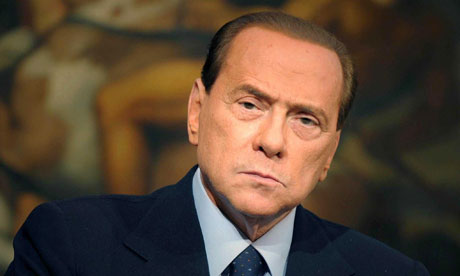
So now, after towering over his nation's political scene for longer even than Margaret Thatcher, the grotesque figure of Silvio Berlusconi has finally thrown in the towel. Having first come to power in 1994, after successfully peddling the notion that a person of his enormous wealth would never be tempted by the corruption that had destroyed his predecessors, this self-styled "new man" turned out not to be "new" at all but to be even more unscrupulous than they had been in using political power to further their private interests. During three terms in office, he implemented none of his promised economic and political reforms but instead passed laws to protect his media monopoly from erosion and himself from trial by the courts on various charges, including one of having illegal sex with an underage prostitute.
All the same, Berlusconi remained remarkably popular for almost two decades. This was largely because of his great gift, very rare among traditional Italian politicians, of conveying energy, cheerfulness and optimism. He practised what he had taught his salesmen during the building of his business empire: to go around with "sun in their pockets". And despite the recent falls in his poll ratings, it was not in the end the electorate that brought him down, nor even the loss of a vote of confidence in parliament, but the verdict of the markets in which he had always fervently believed. He was not pleased. He even expressed bitterness at the way his resignation "to spare Italy a new attack of speculation" had been received by a hostile crowd in the streets: "It is sad to see a generous and responsible gesture being greeted with boos and insults."
But this mood did not last. He may be threatened with about 40 court appearances between now and next May, but he left office still cracking jokes and promising that he would remain a political force to be reckoned with (not an empty promise, given that he still leads the largest party in parliament).
Berlusconi may not accept that this is the end of an era, but most Italians regard it as such and are struggling to find a label for the new era that is beginning. "Post-Silvio" feels a little too backward-looking, and many have been excited to find that the name of Italy's new premier, the economics professor Mario Monti, is an anagram of rimontiamo, which in Italian means "let us remount", or more loosely, "let us get on top again", which exactly reflects the nation's hopes.
Opinion polls now show strong support for Monti and his technocratic cabinet, which doesn't include one single elected politician. But there is also much unease that the change of government has been brought about by foreigners and speculators rather than by Italians themselves. It is hard to fault Berlusconi's claim that the new government has no democratic mandate, though at the same time Monti is no dictator. The survival of his government depends on the backing of an elected parliament, and Berlusconi can deprive it of that whenever he feels like it. He has promised to support Monti until he has pushed through the austerity measures on which Italy's recovery depends, but after that, what? It still isn't a very cheering scenario.
Let's hear it for our politicians!
At least in Britain parliamentary democracy survives, and it was celebrated this week with the Spectator magazine's annual awards ceremony for parliamentarians. It was an inspired decision by a former editor, Charles Moore, to institute these awards some years ago, for politics is about the only profession whose members don't have their own arrangements for patting each other on the back and raising each other's morale. So it feels appropriate that journalists, who enjoy the same kind of standing as politicians in public esteem, should have assumed this responsibility for them.
The ceremony was held this year at a somewhat provocatively lavish dinner in the ballroom at Claridge's in Mayfair, but this slightly uneasy-making backdrop did not diminish the simple cheerfulness of the occasion.
There is something very touching about the obvious pleasure with which these poor, unappreciated parliamentarians, fresh from the ignominy of the expenses scandal, appreciate recognition from even such a tarnished source as the press. Shirley Williams, named Parliamentarian of the Year for her campaign against the government's health reforms, looked absolutely thrilled, as did John Whittingdale MP, chairman of the culture, media and sport committee, who joked that being named Inquisitor of the Year for his grilling of Rupert Murdoch had been "the humblest day" of his life. Even Kenneth Clarke and Theresa May appeared delighted that their unseemly public spat over cats and immigration should have earned them the title Double Act of the Year.
The poor dears are very easy to please.
Why not a total cigarette ban?
The idea promoted by British doctors that smoking should be forbidden in cars would not only be unenforceable except in the most haphazard way, but also a wholly unacceptable interference with human rights.
While smoking remains legal, it obviously must be permitted in private places, and what is more private than the inside of a car? It may well be that secondhand smoke is not good for children, but what if there are no children in a car? Must the driver still desist? And if smoking is banned in cars, why not also in private houses? There may very well be children in them, after all. It remains the case that, even in the modern world, most parents care for their children and can be relied upon to keep them from harm. And if even secondhand smoke is so dangerous, then cigarettes should clearly be banned altogether.

